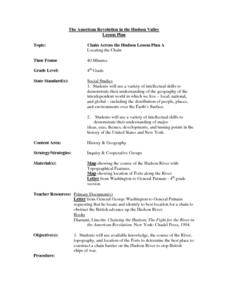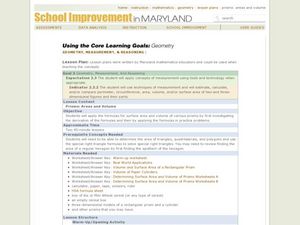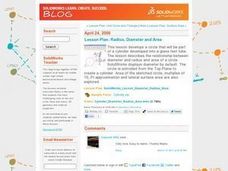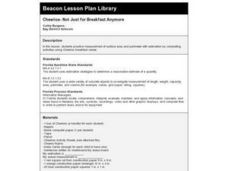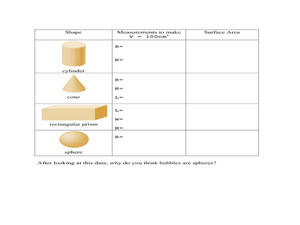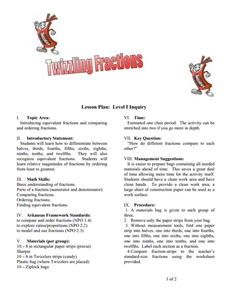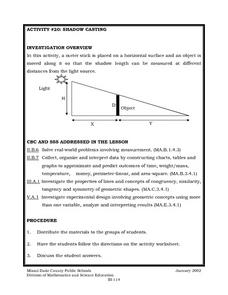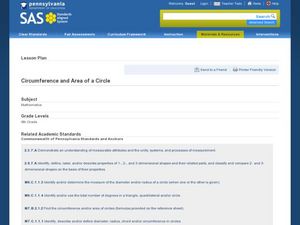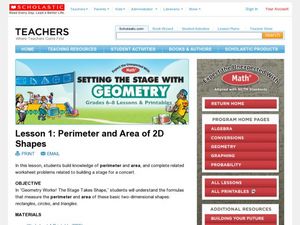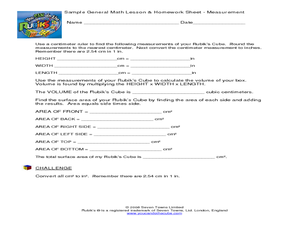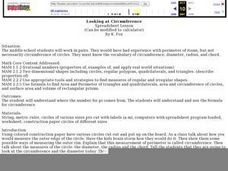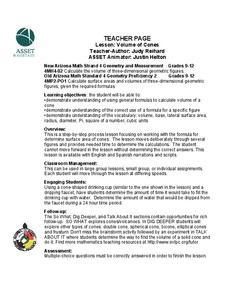Curated OER
Dilations of 2 and 3 dimentional figures and their effect on area, surface area, and volume.
Seventh graders investigate the area and volume of 2D and 3D figures. In this geometry lesson, 7th graders create a storyboard explaining their knowledge of 2D and 3D shapes. They analyze their data and interpret their results.
Curated OER
Troublesome Towers
Students observe solids and identify parts that make up the surface area. For this geometry lesson, students calculate the surface are of solids and cones. They find polygons and solids in the real world.
Curated OER
Classifying Pyramids
Students study pyramids. In this prisms lesson, students explore the attributes of pyramids. Students will explore the lateral surface area of pyramids and be able to distinguish pyramids from other space shapes.
Shodor Education Foundation
Volume of Prisms
Explore the concept of volume of prisms using an applet to perform the calculations. The link to the interactive applet is embedded into the lesson plan as well as a link to associated data sheets. Get your math class to the computer lab...
Curated OER
Chain Across the Hudson Lesson Plan A - Locating the Chain
Students read a letter from George Washington requesting them to identify on a map a location that would stop the advance of British warships. They choose a location and justify their choice.
Curated OER
Geometry, Measurement & Reasoning
Students measure prisms and determine their volume. In this measurement and reasoning activity, students estimate the volume and area of prisms. They measure given boxes. Students use paper to create prisms and cylinders. They determine...
Alabama Learning Exchange
Pennies, Pennies and More Pennies
Learners determine the number of pennies needed to fill a room. For this pennies lesson plan, students work in groups to determine the number of pennies needed to fill a room. They compute the probability of the head of a pin landing...
Curated OER
Radius, Diameter and Area
Students identify the radius and diameter of a circle. In this geometry lesson, students calculate the volume and area of a cylinder and circle. They relate the circumference of a circle to Pi.
Curated OER
Area of irregular Polygons: Historical Motivator - Lewis and Clark Adventure
Seventh graders find the area of irregular polygons. For this lesson on calculating area, 7th graders use the adventures of Lewis and Clark as motivation to learn how to calculate the area of irregular polygons.
Teach Engineering
Manned Mission to Mars
To go or to not to go — the question for a mission to Mars. This resource provides details for a possible manned mission to Mars. Details include a launch schedule, what life would be like on the surface, and how the astronauts would...
NOAA
What Little Herc Saw
See the underwater world through a different pair of eyes! Middle school marine biologists identify deep-sea organisms by examining images taken by an ROV from the Okeanos Explorer. After determining what creatures lie beneath the...
Curated OER
Cheerios- Not Just for Breakfast Anymore
Second graders measure surface area and perimeter using estimation. They complete a variety of measurement activities using Cheerios breakfast cereal.
Curated OER
Why are Bubbles Spheres
Students calculate the surface area of different polygons. In this geometry lesson, students practice calculating the volume of spheres. They work with cones, cylinders and rectangular prisms.
University of Arkansas
Twizzling Fractions
Using food as a manipulative is one of the best ways to incorporate hands-on learning in the classroom. This hands-on approach allows young mathematicians to compare, order, and identify fractions with the use of Twizzlers® and fraction...
Curated OER
Shadow Casting
Eighth graders use a meter stick that is placed on a horizontal surface and an object is moved along it so that the shadow length can be measured at different distances from the light source. They solve real-world problems involving...
Curated OER
Finding the Circumference and Area of a Circle
Sixth graders discover what circumference is. In this measurement lesson, 6th graders identify the radius and diameter of different circles. Students discover how to find the area of a circle using the radius and diameter.
Curated OER
Tricky Traps
Students create identify properties of trapezoids. In this geometry lesson, students calculate the area of given trapezoids and review the area formula for parallelograms. They draw a correlation between the area of a trapezoid and that...
Curated OER
Area Lesson Plan
Students manipulate a variety of materials and computer applets in order to explore area and the units used to measure it.
Curated OER
Perimeter and Area of 2D Shapes
Pupils find the perimeter and area of circles, triangles, and rectangles. In this perimeter and area lesson, the teacher gives students formulas for each shape and measurement and works through examples on the board. While no creative...
Curated OER
Design-a-Lesson-Packaging a Product
Students in a teacher education class address consumer related issues involving packaging. Using volume, surface area and graphs, they create a package for a given volume of a product. They design modifications for this lesson and to...
Curated OER
Measurement
Learners measure angles, perimeter, area and volume. In this geometry lesson, students define different ways to measure and solve for the perimeter, area and volume of geometric shapes. They analyze and process information to help them...
Curated OER
Looking at Circumference
Students understand where the number for pi comes from. They understand and use the formula for circumference. Students measure the circles given out and the diameters of those circles and record the results on their worksheet.
Curated OER
Which container holds a larger amount of popcorn?
What does popcorn have to do with math? Seventh grade mathematicians are provided an opportunity to develop a conceptual understanding of the formula for volume and to use it as a tool to solve problems. The lesson begins with a...
Curated OER
Volume of Cones
Students identify the volume of cones and pyramids. In this geometry lesson, students derive the formula for cones and pyramids. They calculate the volume of cones and other three dimensional shapes.






